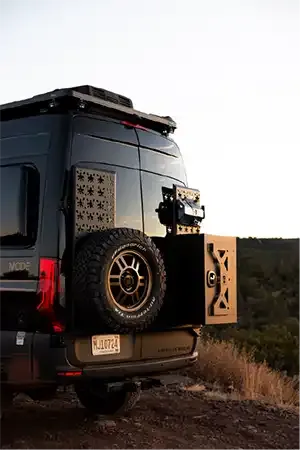Motorhome vs. Towable: Which is Right for Your RV Lifestyle?
When you’re ready to purchase your first recreational vehicle, the options seem endless. One of the first decisions you’ll have to make is what kind of RV you should get. While there are hundreds of options available, the first decision you should make is whether you want a motorized vehicle or a towable. There are finer points you’ll consider later (Do I want a travel trailer or a fifth wheel? Is Class A, B or C right for me? See Types of Towable RVs and Types of Motorized RVs), but the biggest decision is whether you want to drive your home or tow it.
Pros of a Motorhome
Do you love the idea of having access to everything while you’re driving? In a motorhome you can grab a snack from the fridge, use the bathroom or even take a nap on the couch or (in some RVs) on your bed while your co-pilot drives. Not so with a towable. You may not need this, but if you have young kids or plan on long drives between stops, it can make those drives more pleasant.
In smaller Class A’s and Class C motorhomes you’ll have access to most National Parks (no problems with Class B’s), attractions and anywhere you want to go without having to park elsewhere, set up your RV, then unhitch and drive a separate vehicle to get to places where there is regular parking. It saves extra driving time and gives you immediate access to home at the end of the day without having to drive back to another location. Be sure you check the restrictions, however; some National Parks restrict access for Class As over a certain size.
Motorhomes are easier to set up at the end of the day and give you a quicker get-away. When you get to your RV camping site or the spot you’ve picked in the wilderness, all you have to do is level your vehicle and turn off the ignition. When you’re ready to leave, simply unhook and drive away. If you want to check out the sights or go shopping, you don’t have to unhitch anything. When you’re ready to leave, you don’t have to spend time hitching back up. You just drive away. When the weather is bad, this can be a major plus.
Ease of driving is a consideration if you’re going to be traveling a lot or living in your motorhome most or all of the year. Driving a small motorhome through a fast food parking lot is relatively easy. Driving a truck towing a 30-foot trailer is not and you could end up with a problem you’ll have difficulty getting out of. You don’t have to swing as wide making turns in a motorhome as you do when pulling a trailer.
It’s an “all in one” purchase when you purchase a motorhome. Your generator, your propane tank and most features are built in, so you don’t have to worry about purchasing separately. You’re good to go when you drive off the lot.
Finally, you don’t have to invest in another vehicle if you don’t want to. You have the option to tow a car to use for short trips once you’ve settled down for the night, but you don’t have to.
Cons of a Motorhome
Yes, you have only one vehicle to worry about (unless you’re towing a car). This also means if your motorhome breaks down, you’ll be without a home base until it’s repaired. You won’t have a place to stay or a means of transportation until repairs are done. Also consider that there are generally more repairs needed for a motorhome than a truck and towable over time. You should budget twice as much for repairs to a motorhome.
Fuel economy used to be a big negative with motorhomes, but this has improved in recent years. It also depends on whether you’re towing a car for ease of movement when you’ve parked your RV. Be sure to consider whether you’ll be towing another vehicle to get accurate mileage comparisons.
In general, a motorhome is going to cost you substantially more than a trailer or fifth wheel. The price differential isn’t as great, however, if you’re going to have to invest in a truck to pull your travel trailer or fifth wheel the cost will increase. If you already own a truck that’s capable of pulling your trailer, you’ll save money with the trailer. Adding a few square feet of additional room to a motorhome is more expensive than adding a few square feet to a trailer.
Pros of Towable RVs
If you need lots of storage for items such as canoes, kayaks, bikes, etc., a towable RV gives you more storage in both your trailer and in the bed of your truck. Keep in mind, however, that the storage in your truck bed is open to the elements. By contrast, storage can be more limited in a motorhome, particularly in a Class B vehicle. With Class As, you’ll have more outside storage that is covered, but not as much as in a trailer or fifth wheel.
If you’re towing a trailer, chances are you have a 4 x 4 truck. This gives you better access to rough terrain, remote locations and areas where the roads are too questionable for a motorhome. If you love boondocking in remote areas, you’ll have more access with a truck and trailer than with any motorhome.
The interior is more spacious per square foot in a towable RV because there aren’t as many mechanical parts, the engine isn’t taking up space and you don’t have a section that’s reserved for the cockpit. If you treasure lots of space, you’ll get more for your dollar with a towable RV compared to the same amount of usable space in a motorhome.
One of the “pros” of a towable is that you can more easily customize features like the propane tank and you’ll get to choose what kind of generator you want. For someone who has specific requirements, this is a great way to customize your ride. For people who don’t want to hassle with the details, this could also be a “con.” It depends entirely on preference, but it’s something to keep in mind.
Cons of Towable RVs
While towing your RV means you can still access it if your truck needs repaired (and vice versa), you also have to worry about the mechanics and upkeep of both. It’s one more thing to worry about (but if you’re towing a car behind your Class A motorhome, you’ll run into the same problem).
Towable RVs just aren’t as convenient as motorhomes. When rolling down the road, you won’t have access to your fridge, your bathroom or any of the other amenities that make the RV life easy. If you’ll be driving long distances a lot, you may get tired of having to stop and use public restrooms and rest stops or getting in and out of your trailer then back in the truck whenever you want a cold drink.
Driving and parking are both more difficult with a towable than with all but the largest motorhomes. You’ll have to learn how to back up, park and maneuver a truck with trailer or fifth wheel, which can take some time. Driving a motorhome is easier for most people because it’s like driving a van or panel truck.
Although there are exceptions, the resale life of a towable RV isn’t as good because they generally aren’t as durable as motorhomes. They have less insulation, they usually don’t have higher end features like granite countertops and they simply don’t wear as well as motorhomes.
The number of pros and cons for motorhomes and towables doesn’t matter. Which ones are most important to you should be the deciding factor when you’re deciding which kind of recreational vehicle you want. Consider your dream lifestyle on the road, then choose the RV that has the most “pros” for that lifestyle. Happy Camping!


